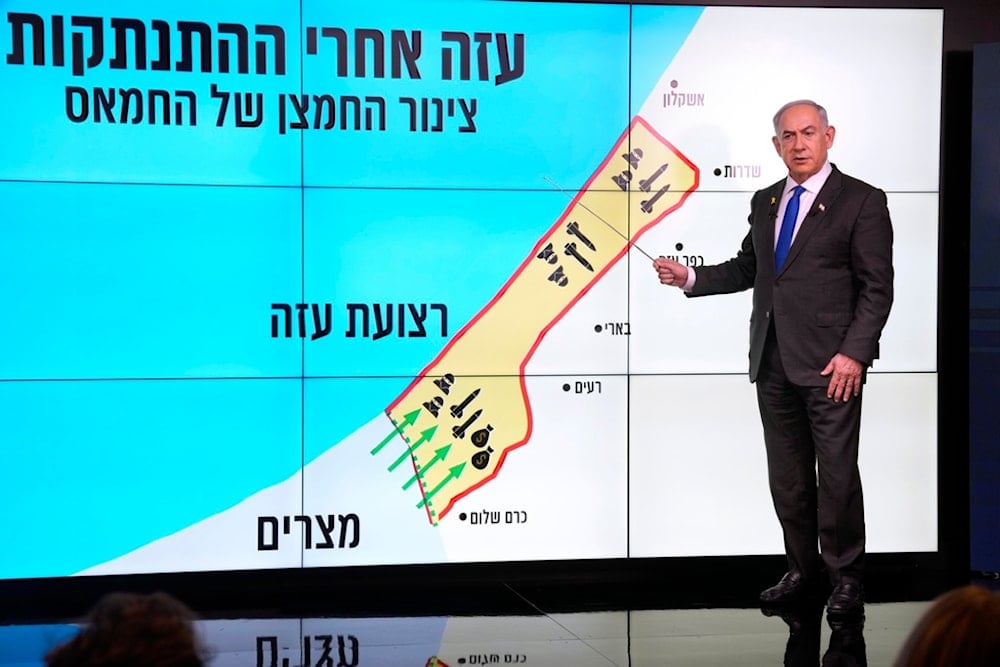Hamas official responds to Mossad chief about Philadelphi: Exclusive
A leading source in the Palestinian Resistance responded via Al Mayadeen to the remarks made by the head of the Israeli Mossad to the mediators regarding the Philadelphi Corridor. The source also announced Hamas' position on the proposal, as mediators work to present a detailed plan later this week.
-

Israeli Prime Minister Benjamin Netanyahu stands before a map of the besieged Gaza Strip, telling viewers that "Israel" must maintain control over the "Philadelphi Corridor," during a news conference in occupied al-Quds, on September 2, 2024. (AP)
In a statement to Al Mayadeen, a leading source in the Palestinian Resistance responded to what the head of the Israeli Mossad, David Barnea, said to mediators regarding the occupation of the Philadelphi Corridor.
In the details, the leader told Al Mayadeen that the head of the Mossad informed the mediators that the occupation forces "will withdraw from the Philadelphi Corridor in the second phase of the agreement," stressing that the Resistance does not approve of that.
He added that "Hamas demands the withdrawal of the occupation forces from the Philadelphi Corridor in the first phase, as there are no reliable guarantees for achieving the second phase."
According to Israeli Channel 10, "The United States, Egypt, and Qatar are working on crafting a detailed plan, which will likely be publicly presented later this week by US President Joe Biden."
New talks on a possible deal
Recently, Barnea informed the mediators that "Israel agrees to withdraw from the Philadelphi Corridor during the second phase of the prisoner exchange deal, despite Prime Minister Benjamin Netanyahu's insistence on maintaining control over the corridor."
Netanyahu's office did not deny the report but stated that "the cabinet is not yet required to discuss any aspect of the second phase of the deal."
"Israel's" Makan channel website explained that the United States, Egypt, and Qatar have recently engaged in crucial talks to "formulate a framework for a ceasefire and the return of prisoners," adding that the mediators plan to publish the broad outlines, likely by President Biden, by next Friday.
For this reason, Barnea headed to Doha the day before yesterday, where talks are likely to continue in the coming days, according to the website.
A source familiar with the talks revealed that the Israeli position "insists on maintaining an Israeli presence in the Philadelphi Corridor during the first phase of the deal, including a reduction of forces, with a complete withdrawal planned for the second phase."
In this context, the website quoted an Egyptian source as saying, “Netanyahu is prepared to undermine Israel for his own interests,” following “Cairo’s close attention to the press conference Netanyahu held two days ago. In that conference, Netanyahu placed Egypt in the spotlight concerning the Philadelphi Corridor, which the Egyptians found, to say the least, highly objectionable.”
Egypt: Netanyahu attempting to derail deal
The Egyptian Foreign Ministry condemned Netanyahu's statements earlier on Tuesday, accusing him of another attempt to derail the deal. According to the source, "Netanyahu is trying to make it seem as if Egypt is the problem to cover up his failure," therefore "Cairo had to respond with a sharp statement to his words."
Netanyahu insisted on maintaining control over the Philadelphi Corridor. In a televised press conference in occupied al-Quds two days ago, he emphasized his “firm position on the Philadelphi Corridor, which will not change,” describing it as “Hamas’ oxygen pipe that must be cut off.”
He argued that “the Israeli army’s withdrawal from the Philadelphi Corridor turned Gaza into a major threat and essentially opened the door for weapons and other supplies to reach Hamas.”
It is noteworthy that in late August, the political-security cabinet approved, by a majority of eight supporters to one objection [Security Minister Yoav Galant] and one abstention [Police Minister Itamar Ben-Gvir], the maps outlining the presence of the Israeli forces in the Philadelphi Corridor as part of a potential prisoner exchange deal.
In contrast, the Palestinian Resistance has consistently reaffirmed its stance on reaching an agreement, which demands “a comprehensive cessation of aggression, a complete withdrawal from the Strip, the commencement of reconstruction, and the lifting of the siege, alongside a substantial exchange deal.”

 4 Min Read
4 Min Read










